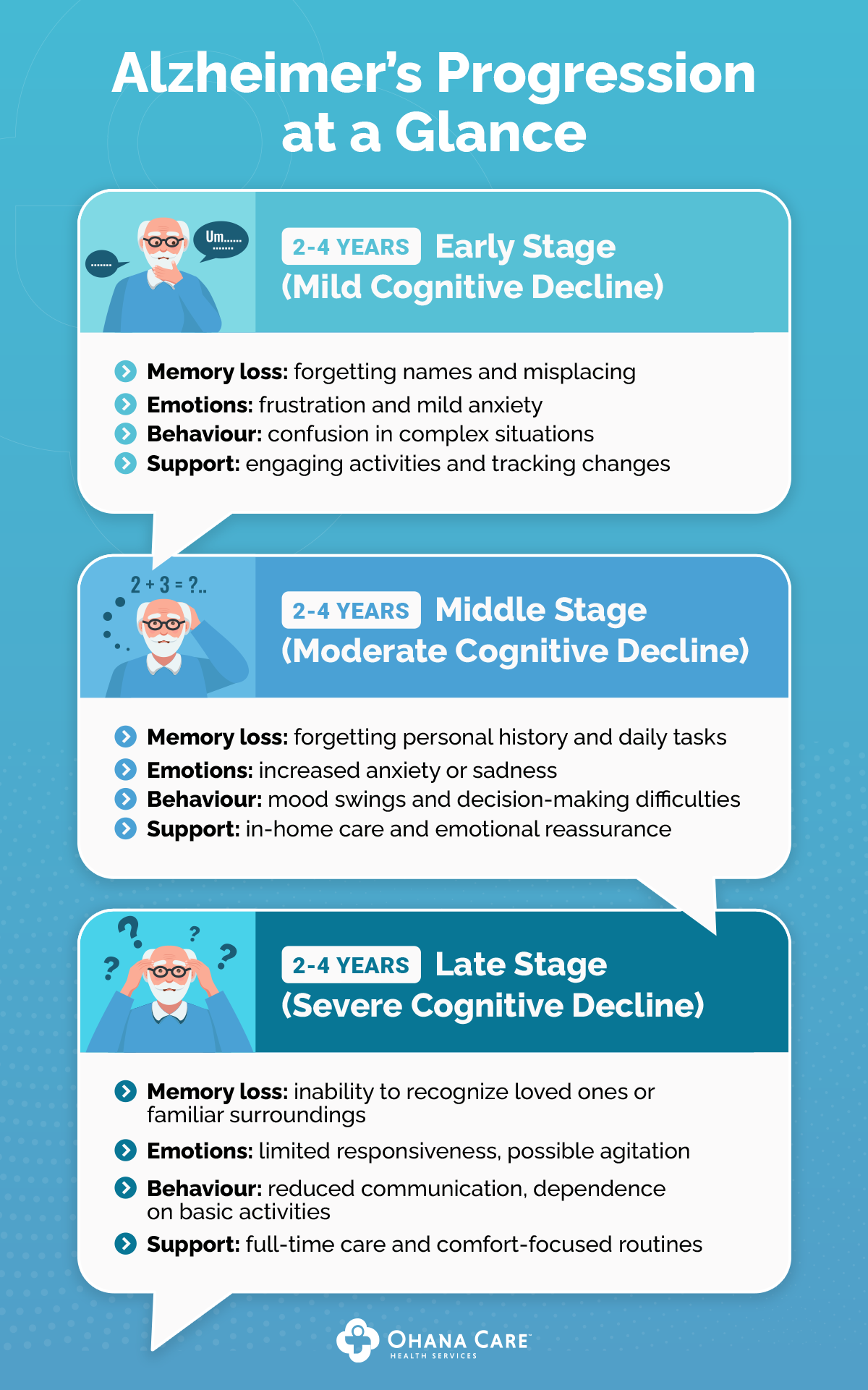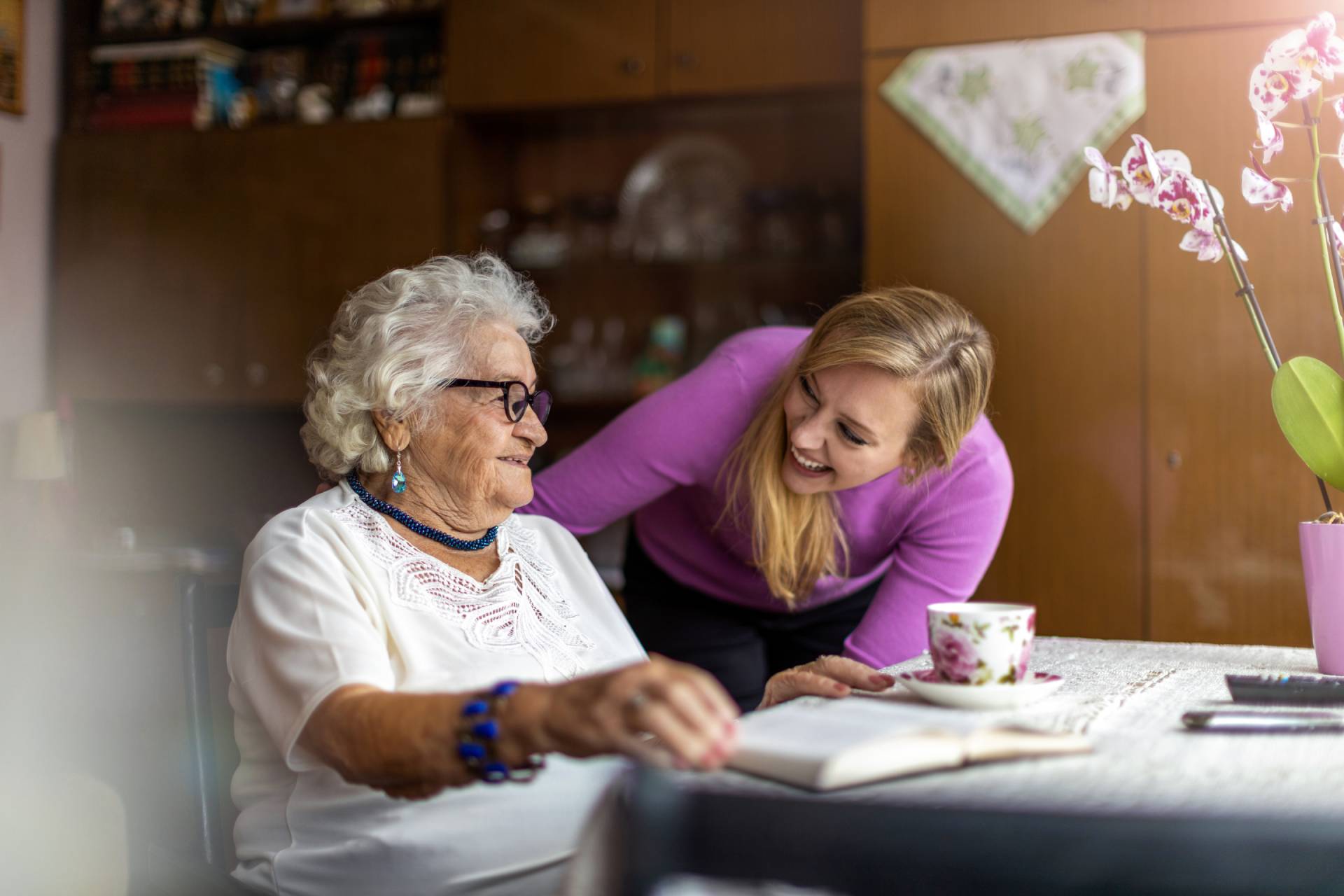When a loved one is living with Alzheimer’s disease, the journey can feel overwhelming and deeply emotional. At first, you may notice small lapses in memory or minor changes in daily routines, which can often seem like a regular part of aging for our senior loved ones. Over time, when Alzheimer’s disease is the cause, these changes often grow, affecting independence, relationships, and the balance within a family.
It’s natural to feel pulled in many directions, emotionally drained, uncertain, and stretched thin. But you don’t have to face this alone. Support and guidance are available to help you and your loved one navigate each stage of the disease.
Although no two people experience Alzheimer’s in the same way, understanding how it typically progresses can bring clarity during uncertain times. The seven stages outlined in the Global Deterioration Scale (GDS) provide families with a framework to prepare for what lies ahead.
What is Alzheimer’s Disease?
Alzheimer’s disease is a progressive condition that affects the brain, gradually changing the way a person remembers, thinks, and communicates. It is the most common form of dementia and often develops slowly, beginning with little memory lapses before impacting daily living.
Although there is currently no cure, families can still create meaningful moments of joy and connection at every stage of the disease. By understanding what to expect, you can better support your loved one while also taking care of yourself.
What is the Global Deterioration Scale?
The Global Deterioration Scale (GDS) was developed by Dr. Barry Reisberg as a framework for understanding how Alzheimer’s disease progresses. It divides the disease’s progression into seven stages, ranging from no cognitive decline to severe decline.
Each stage has unique challenges, but also opportunities for families to adapt, connect, and provide the right level of care and comfort.
The Stages of Alzheimer’s Disease & What to Expect

1. No Cognitive Decline
What Does This Stage Look Like?
At this point, your loved one shows no signs of memory loss or difficulty, and life continues as usual.
What Does This Stage Feel Like?
For families, Alzheimer’s isn’t yet on the radar. Everything feels stable.
What Support is Needed At This Stage?
No special care is required, though healthy habits such as exercise, balanced meals, and staying socially active can help keep the brain strong for years to come.
2. Very Mild Cognitive Decline
What Does This Stage Look Like?
You may notice small memory lapses, like forgetting names or misplacing familiar items. While these moments are often seen as part of normal aging, they can feel concerning for both your loved one and family.
What Does This Stage Feel Like?
For seniors, this mild stage might feel like occasional absentmindedness. Although these moments are usually mild, they can feel frustrating or confusing, making you more aware of changes in your thinking.
What Support is Needed At This Stage?
No formal care is needed. Encourage your loved one to stay engaged in activities they enjoy and keep track of any changes over time.

3. Mild Cognitive Decline / Early Stage Alzheimer’s Disease
(Sometimes called mild cognitive impairment)
What Does This Stage Look Like?
In this early stage, memory problems become more noticeable. Your loved one may lose track of conversations, forget appointments, or feel less confident in decision-making. Families often begin to sense that something is different.
What Does This Stage Feel Like?
Mild cognitive impairment can be frustrating for seniors, and they may try to cover up their difficulties. You may also notice mood changes in your loved one, like feeling withdrawn or irritable, especially in socially or mentally challenging situations. Personality or behaviour can shift as well, including suspiciousness or repetitive actions like fidgeting. These experiences can confuse your loved one and may signal the early impact of cognitive changes.
What Support is Needed At This Stage?
Gentle reminders, patience, and medical evaluation are important. This is also a good time to begin planning ahead, like discussing care wishes, financial matters, and ways to make life easier at home. Having support from a caring LPN or Health Care Aide can help guide these conversations and provide gentle assistance as your loved one navigates this time.
At this stage, your loved one may still engage in conversation, even as memory lapses become more noticeable. Talking with them about your day, sharing stories using familiar words, and showing photos of everyday life can be incredibly helpful! These simple gestures not only stimulate memory and understanding but also strengthen emotional connection, letting your loved one feel included and valued.
4. Moderate Cognitive Decline / Mild Alzheimer’s Disease
What Does This Stage Look Like?
Daily tasks like paying bills or managing appointments may start to feel overwhelming.
Have you ever forgotten something for a few hours or even a few days? For someone in this stage, those moments of forgetfulness happen more often and last longer.
Your loved one may begin repeating questions or losing track of recent conversations and events, which can start to affect daily life in noticeable ways.
What Does This Stage Feel Like?
Anxiety, sadness, or withdrawal are common emotional responses as your loved one becomes more aware of memory changes. They may struggle with independence, seem emotionally less responsive, or even pull back from conversation to cope with or hide the challenges they’re facing.
What Support is Needed At This Stage?
At this stage, it may be the first time conversations about in-home specialized care arise. In-home care isn’t a prescription, but a way to make daily life easier.
While these talks can feel difficult, approaching them with empathy and reminding your loved one that they have a supportive network can help when identifying when at-home care is needed.
5. Moderately Severe Cognitive Decline / Moderate Alzheimer’s Disease
What Does This Stage Look Like?
Memory loss becomes more noticeable at this stage. Your loved one may forget personal history or familiar places, such as their address, or need help with daily choices like selecting proper clothing. Independence is increasingly limited, and this change can be difficult for both them and your family.
What Does This Stage Feel Like?
During this time, feelings of frustration, confusion, or isolation are common.
Incorporating physical touch, like gentle and reassuring gestures such as holding a hand, offering a hug, or a simple touch on the arm can bring comfort, ease anxiety, and nurture a sense of closeness and connection.
What Support is Needed At This Stage?
At this stage, living alone is no longer a safe option.
Your loved one will need in-home care to support daily routines, personal care, and safety. This can include family involvement, professional caregivers, or a combination of both.

6. Severe Cognitive Decline / Moderately Severe Alzheimer’s Disease
What Does This Stage Look Like?
Your loved one may no longer recognize close family members and will need help with basic activities like dressing, bathing, and eating. Behavioural changes such as wandering or restlessness can also appear.
What Does This Stage Feel Like?
This stage can be deeply emotional for families. For seniors, it may bring confusion, fear, or moments of agitation.
What Support is Needed At This Stage?
24-hour care is necessary. Professional caregivers, memory care programs, or assisted living facilities can provide safety and compassionate support. Families also benefit from counselling and respite to prevent burnout.
Even as communication becomes more limited, sharing stories, talking about familiar events, and showing images can still bring comfort. While responses may be slower or nonverbal, these moments help your loved one feel seen and connected, and they give you meaningful ways to maintain closeness when words alone are not enough.
7. Very Severe Cognitive Decline / Severe Alzheimer’s Disease
What Does This Stage Look Like?
In the final stage, your loved one may lose the ability to walk, speak, or eat without assistance. They become completely dependent on caregivers for all daily needs.
What Does This Stage Feel Like?
For families, this can be a heartbreaking time. Comfort, dignity, and presence become the most important gifts you can give.
What Support is Needed At This Stage?
Skilled nursing or palliative care can help ensure your loved one’s final stage is met with compassion and peace. Emotional support for the family is just as important as physical care for the senior.
Why Does Dementia Progress Through Stages?
Alzheimer’s progresses as brain cells are gradually damaged, first affecting memory and learning before reaching areas that control language, reasoning, and even physical abilities. While the timeline varies for every individual, the major events reflect a general journey many families experience.
Understanding these stages can help you plan with love, patience, and preparedness, ensuring your loved one experiences comfort, dignity, and support for both their mental function and emotional well-being every step of the way.
Get the Support You and Your Loved One Need Through Every Stage of Alzheimer’s Disease
Caring for a parent or grandparent with Alzheimer’s can be overwhelming, but you don’t have to face it alone. Whether your loved one is experiencing memory lapses, psychological symptoms, or increasing dependence, support from healthcare professionals exists at every stage—whether you need a few hours of respite each week, assistance to help them live independently, or full-time dementia care.
At Ohana Care, we understand that Alzheimer’s influences memory and daily routines, while also touching the emotional lives of seniors and their families. Our dedicated Health Care Aides and Licensed Practical Nurses are here to provide compassionate, personalized support that helps your loved one live safely, comfortably, and with dignity.
Whether it’s assistance with daily activities, dementia-specific care, or simply companionship to brighten their day, we tailor our services to meet your family’s unique needs.
If you’d like to learn more about how our in-home care services can support your loved one through every stage of Alzheimer’s, we’d love to hear from you. Contact us today to explore how we can help maintain independence, enhance quality of life, and provide peace of mind, right in the comfort of your loved one’s own home.





